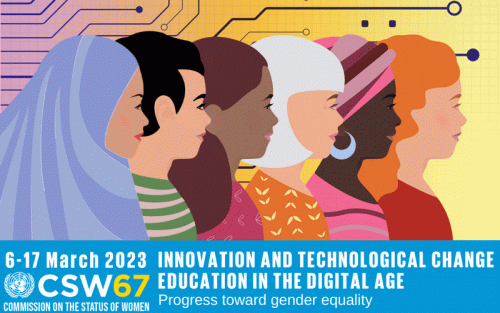The Cultural Effect of the Commission of the Status of Women on Our Black and Brown Young Women
The Commission on the Status of Women (CSW) has been happening since 1947. Activists and leaders from around the globe have gathered at the United Nations. With a global perspective, delegates were able to engage with priority theme, or main focus – innovation and technological change, and education in the digital age for achieving gender equality and the empowerment of all women and girls. Both domestic and internal participants in CSW were able to connect and share the efforts being done in their own area of the world. This included the way organizations and countries are working to center the voices of women of color – Black and Brown women. In my opinion, there is no people group that is more oppressed (as it relates to intersectionality) than Black women.

Being a woman of color, my in-person experience at the Commission on the Status of Women was one where I was actively invited in. This was not done in a tokenizing way; rather, seeking to genuinely understand the thoughts, challenges, and successes of Black women. Thoughtful listening is key when it comes to learning with and from those who influence and fuel your activism. Historically, the voices of women of color have been silenced and ignored. For me, the Commission of the Status of Women was a space in which these voices were elevated.
Think back to a time when you heard, “oh, I don’t see color. We are all the same!” Or maybe, “why is everything about race?” Though these statements can be made from sometimes well-meaning people, it perpetuates the erasure of Black and Brown people. These statements and more were addressed during my time at the Commission on the Status of Women in events hosted by various non-government organizations (NGOs). Seeing color, along with other differing identities, is essential to the work of loving our neighbors and advocating for the needs of Black and Brown women.
My experience as a Black woman at CSW was empowering and unique. It is something I will certainly carry with me into the work that I do as activist and woman of faith. Visiting the United Nations and I encourage anyone who has the opportunity in the future to participate in this life-changing experience.
___________________________
Presbyterian Disaster Assistance is the emergency and refugee program of the Presbyterian Church (U.S.A.). Along with congregations and local mission partners, PDA responds quickly to the needs of our siblings globally. Their ministry includes serving women and girls of color in areas impacted by natural disaster and those seeking refuge.
Naomi McQuiller is a Young Adult Volunteer in the PC(USA) and served as a delegate to the 2023 Commission on the Status of Women. You can learn more about women’s leadership development and young women’s ministries here.